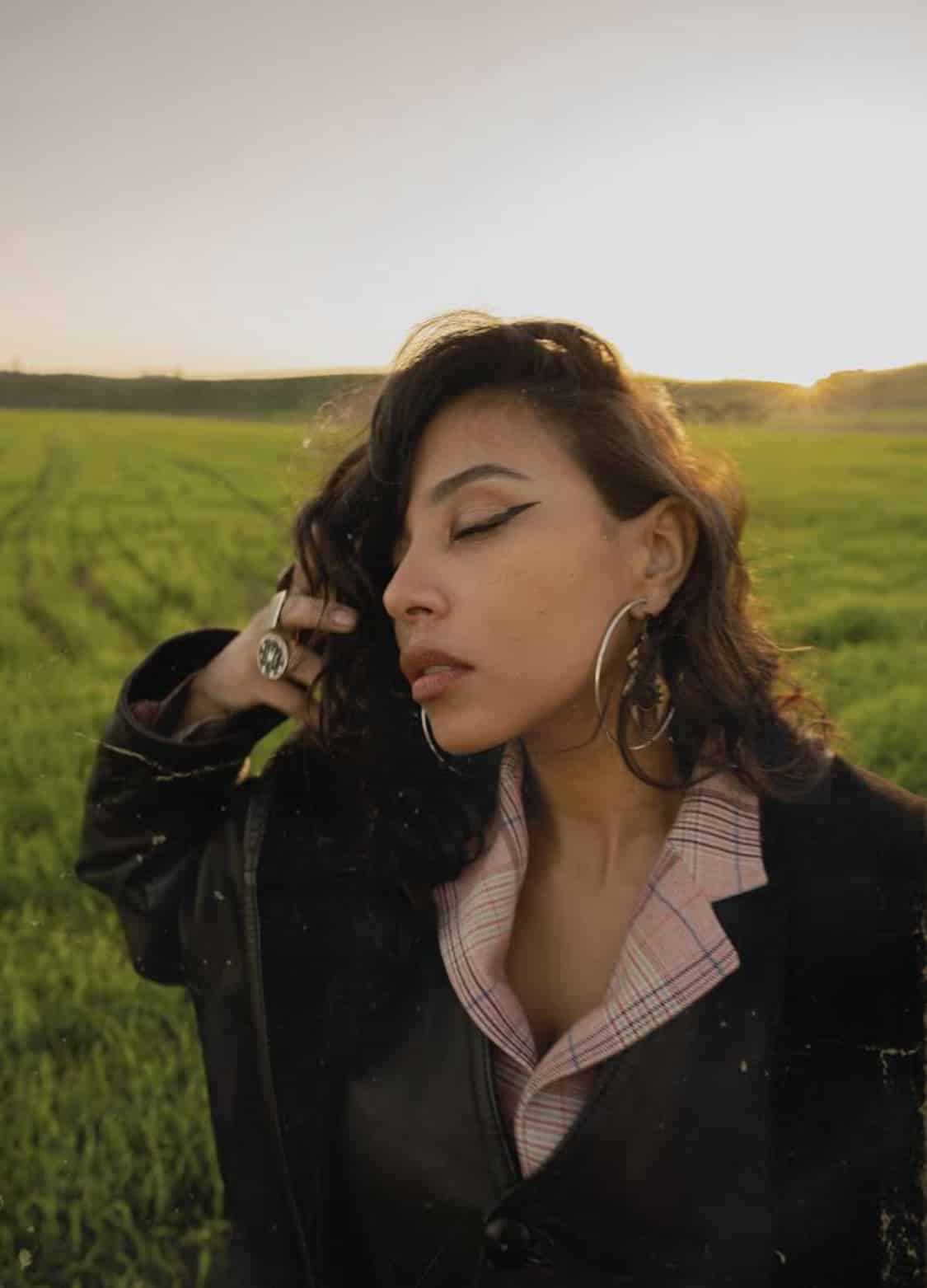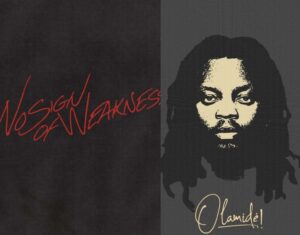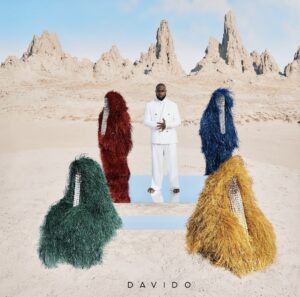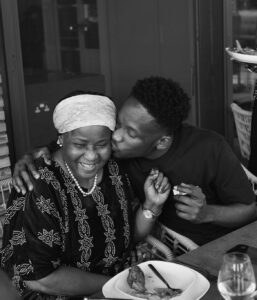“This girl can siiingg.” These were the first words I uttered when listening to Rhita Nattah’s songs. The other things I said were along the lines of how pretty she was and how sure I was that she is made for stardom. Today at Soot Africa, we’ll explore the mind of the beautiful Moroccan star Rhita Nattah.
The young singer’s music borders on soulful sounds, with predominant Moroccan melodies. All it takes is one listen, and Rhita’s voice transports the audience to a tranquil realm where time stands still. She started getting recognition after posting covers of famous Nigerian songs, which went viral.
I had a long and exciting conversation with Rhita about her music, struggles, and every obstacle she has had to overcome to get to where she is now. While the conversation may have lasted only for a short while, I won’t forget it in a hurry.
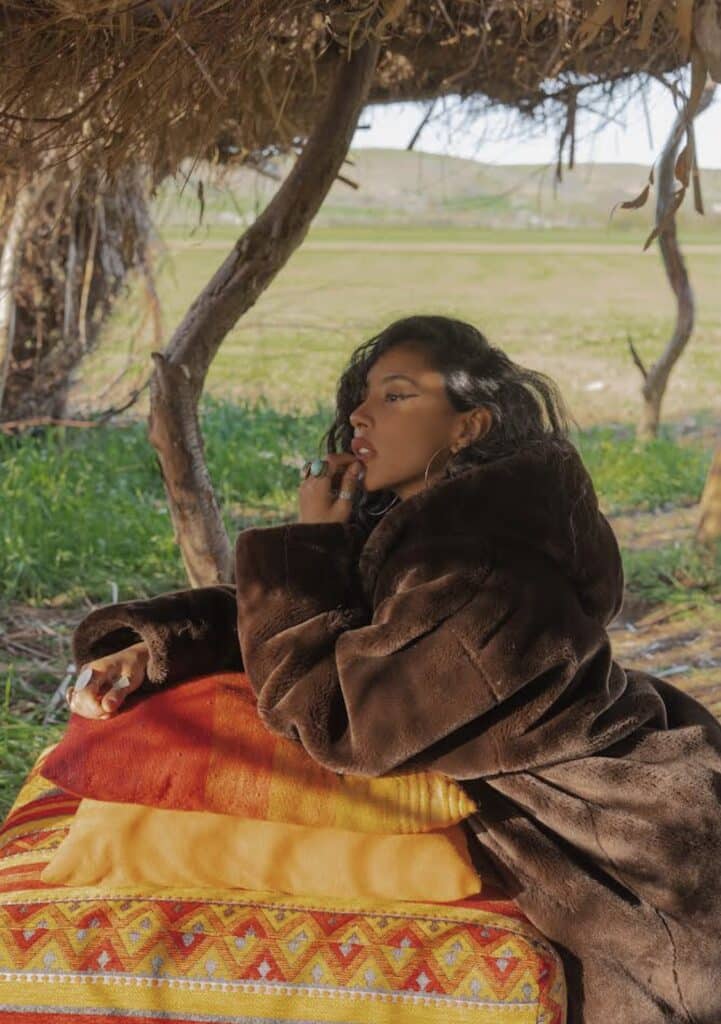
You have an amazing voice Rhita, I’m sure you get that a lot of times, but I bet it won’t hurt to hear it one more time.
Thank you so much; this means a lot to me. Sometimes I forget that, and I doubt myself.
As silly as it sounds, we laugh about this. I told Rhita I could relate to this as a creative, and sometimes I needed someone to remind me of how good my craft is.
How old were you when you realized “I can sing.”
I don’t remember exactly, but I always loved singing in front of my family members and making them laugh. I started singing in my room and fell in love with it as a teenager.
What inspired you to start singing professionally? When did you know you wanted to do this as a career?
I always knew I wanted to do this professionally, but when preparing for my master’s degree research, I found a conversation with one of my friends in 2016 where I told her I didn’t think I would ever use my master’s degree. I knew I wanted to do music professionally but I needed to figure out how. It was even more difficult for me because I grew up in Morocco, where the music industry is almost non-existent. Singers didn’t get their royalties, and any parent who heard their child was going into music would get sad because they knew there wouldn’t be any money coming out of it.
Rhita Natta’s Struggles As A Young Moroccan Singer
Just like you said, it must’ve been so difficult to start your career as a singer with your Moroccan background; how have you navigated it as a young woman?
It’s still not easy, but I feel music in my heart. I had to manage the struggles and push through because I always say to myself, if music is in my heart, it’s for a reason. I endured all the financial difficulties because I knew I was born to do this. Not long after I started, Swiss Band found me from the videos I put up on social media. I was 19, 20 at the time, and I worked for them, but that didn’t end well.
I’ve written and composed songs in the past but haven’t gotten any royalties for some of them. There’s currently a song of mine on a Netflix show that has over 100 million views on YouTube, but I got little to no credit for it. The name Rhita Nattah was only mentioned but that was it. At the time, I was young and had little information about music royalties. In 2016 I had little to no money to survive because I was singing, but I wasn’t getting anything to show for it.
Later, I started my solo career with Sam, my producer, and husband. He was a graphic designer who gave up everything to pursue music, just like me. He went from a good monthly salary to zero to pursue that. Everyone around us thought we were crazy. Our moms were mad, and everyone around us went… wtf are you doing?? Being in Morocco didn’t make it any easier. Yet, we stuck to our principles.
It sounds like you had to make many tough decisions to pursue music, and I bet you don’t regret them.
No, I don’t. We make bloody sacrifices to win, but we’re in it.
I could feel the passion for music in her voice, and I did not doubt that if Rhita Nattah had to go through it all over again to pursue her love for music, she would.
You mentioned some of the covers you did in 2018 for songs from artists like Wizkid, Duncan Mighty, and many other stars. That played a massive role in bringing your art to the spotlight. How did you feel when you finally started to get some recognition?
I was thrilled because Africa was finally beginning to hear about me. Wizkid reposted my cover, and Lewis Hamilton commented on one of my posts. It was amazing. I covered a lot of Nigerian songs, songs from Tekno, and a lot of other artists. It was crazy because, at the time, not many people were listening to Afrobeats. And I sang them with my voice and a guitar, which greatly surprised people. I was also particular with the words. I made Nigerian friends on Instagram, and they taught me how to pronounce the Yoruba words correctly. One of the first songs that gave me the idea of doing covers of African songs was a Mr. Eazi song from 2017.
People were disappointed when I stopped doing covers and started trying to find my sound. I wanted to focus on my sound and create something inspired by my Moroccan background. People wanted me to do covers for Ojuelegba and many other Afrobeats songs, but I had to follow my heart and stopped covers in 2019. That’s when I released my first solo song, “Not the Same.” The only time I did another cover was for “Fuck You” by Kizz Daniel. I loved it so much and couldn’t help myself.
Rhita’s Relationship With Nigerian Music
You obviously love Nigerian music and Nigerian artists. If there was anyone Rhita Nattah could collaborate with in the future, who would it be? I know you worked with Terry Apala in 2022. How was it to work with Terry on that?
I was in love with Terry’s voice right from the first time I heard him sing. So we followed each other on social media, and he said we needed to work on a song together, and I said yeah. So he sent a piece, and I heard it, and I sang my part and sent it, and it turned out great. I really would love to make a song with Kizz Daniel. His “Fuck You” song is so brilliant.
At this point, Rhita gets carried away and hums to the song. You can tell she still loves the song even after so many years. Who can blame her, though? It’s a really good one.
That song is a masterpiece. What attracted me to Nigerian music is the top lines. All Nigerian songs have unique lines and melodies. The beats can be similar sometimes, but the top lines are always unique. I always ask my Nigerian friends who sing where they get their inspiration from. So, apart from Kizz Daniel, I also connected with Bloody Civilian. I’d also love to sing with Tekno, and I’d love to do a song with JP because he is outstanding. I love Nigerians.
I noticed.
Rhita then hums some more, and it’s almost like I’m in a private listening session. One I thoroughly enjoyed.
I look forward to hearing about a collaboration with Rhita Nattah and Kizz Daniel or GP. I’m sure it’s going to be magical. So, when I listen to your music, I notice you sing with conventional Moroccan beats and instrumentals, but the lyrics are primarily in English. That is different from what we hear most of the time. How do you manage to make your sound so authentic and cool?
Thank you. I’m glad you feel that way. Working on my sound took a long time- Sam and I. We didn’t want to copy anyone. Sometimes we can take up to six months to work on one song. It’s a serious affair for us. Like Fela Kuti said, “We don’t play with music.” Plus, it’s my duty to talk about what matters, just like Nina Simone said. I need to talk about things that matter.
At this point, I don’t need to ask who her role models are, it’s pretty obvious. The girl knows her stuff.
I choose the topics of my songs very carefully. If anything is happening in the world or there’s a problem in my society, I can’t keep quiet about it. Sam was a musician before becoming a producer, and that makes his compositions excellent and unique. We do everything; we record and play the drums and Moroccan percussion.
It’s authentic because we do it from our hearts and respect the music. I do this because music saves me; it keeps me sane in this crazy world. I do it to inspire the people who want to go into music but need a way to do it. I’m not just trying to be famous. I want it to be real. If it brings fame, fine. If it doesn’t, that’s fine as well. I’m okay knowing that I didn’t compromise to fit in. Sam has mad respect for art, too; he’s a hard-working person who takes his time to come up with new things. I’m happy you feel my music is authentic. I hope other people think that way about Rhita Nattah as well.
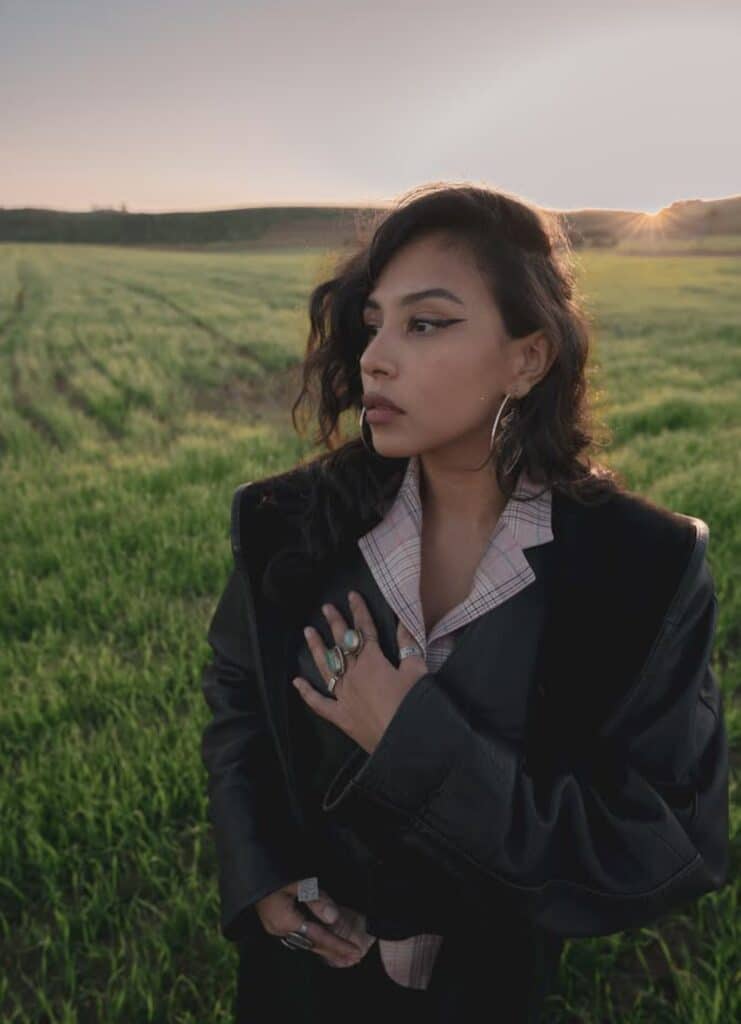
All About The EP, INNER WARRIOR
Let’s talk about your recent EP. What’s the story behind “INNER WARRIOR”? It had a lot of soulful lyrics and strong messages.
As I mentioned before, Inner Warrior is the brave person inside of you who helps you make risky decisions and go for things. I always say everyone has an inner warrior inside them, and they must follow that. The EP is about how strong I was in certain periods of my life. Trying to pursue music in Morocco with limited opportunities was challenging. Only some things were welcome by the public and media.
It’s a really lovely project. You mentioned Sam a lot, your husband. What’s the dynamic like working together? Is it good, or is there tension sometimes?
When we work, we also argue about music. The good thing is that we both have the same idea about how music should sound even though we grew up from two different backgrounds. Sam grew up listening to rock metal bands, and I grew up listening to traditional Moroccan percussion-focused music. But we connect over music and always agree on the direction when composing. We don’t want to make music because it’s trendy but because it sounds good. So it’s very peaceful to work with him, and when we argue, it’s about the music. But we push each other to do better all the time.
I’m sure you feel blessed to have someone you love who you always work with.
I very much do
What’s Next For Rhita Nattah?
So what can we expect from you soon in terms of music?
Well, I’m still working as an independent, and making music takes me a while. For example, I started recording my EP in 2021, but it took us six months to mix and master. So what you should expect from me is that I’m keeping the creative process going. I’m already working on an album. I don’t know when it’s going to be out. I write my songs myself, and I record my vocals with no recording engineer, and it all takes a lot of time. I’ll be staying true to my art and creative process. I will challenge myself, write new stuff, and bring something beautiful.
I will still sing about politics and social injustices even if people might not want to always listen to it, but I can’t help it; it’s what’s happening around me. My goal is to do concerts everywhere someday. It is challenging now as an independent, but that’s where I am. I want to have several features on the album. I have one with a Russian girl, and I want some from my favorite musicians and so much more.
Our fingers are crossed; we can’t wait to hear more music from you. Why doesn’t Rhita Nattaah have a manager right now, though? Do you have any plans on getting one soon?
I’d love to get a manager, but I am still looking for someone who will understand my vision the way I want. I don’t want them to say, ‘Hop on this beat because it’s trendy.’ I want my manager to share the same vision with me. I can’t compromise, I need to find someone who trusts in me and believes in my sound. The person must have principles and not just be interested in money. I’ve tried with a few before, but it didn’t go well. I pray I find someone genuine and honest. So it’s not that I don’t want a manager, I need a manager.
That’s true; the music industry can be crazy.
Yeah, and we don’t even have one in Morocco. Being an artist manager is still a very new job there too. People are still figuring out this whole music industry and royalties thing. When I talk about royalties on my social media, I’ve had many people reach out to me and ask for more information because they’re clueless. Music management in Morocco is new, so it’s hard for me to find one.
I really hope your voice gets heard and you get to amplify this issue as much as possible. I’m sure you’re inspiring a lot of people.
Yeah, I got a lot of messages from young girls my age when I started music, and they’re always asking for advice. I always tell them, ‘You have to make up your mind; not everyone can do this without money. So If you feel it in your heart for real, go for it.’
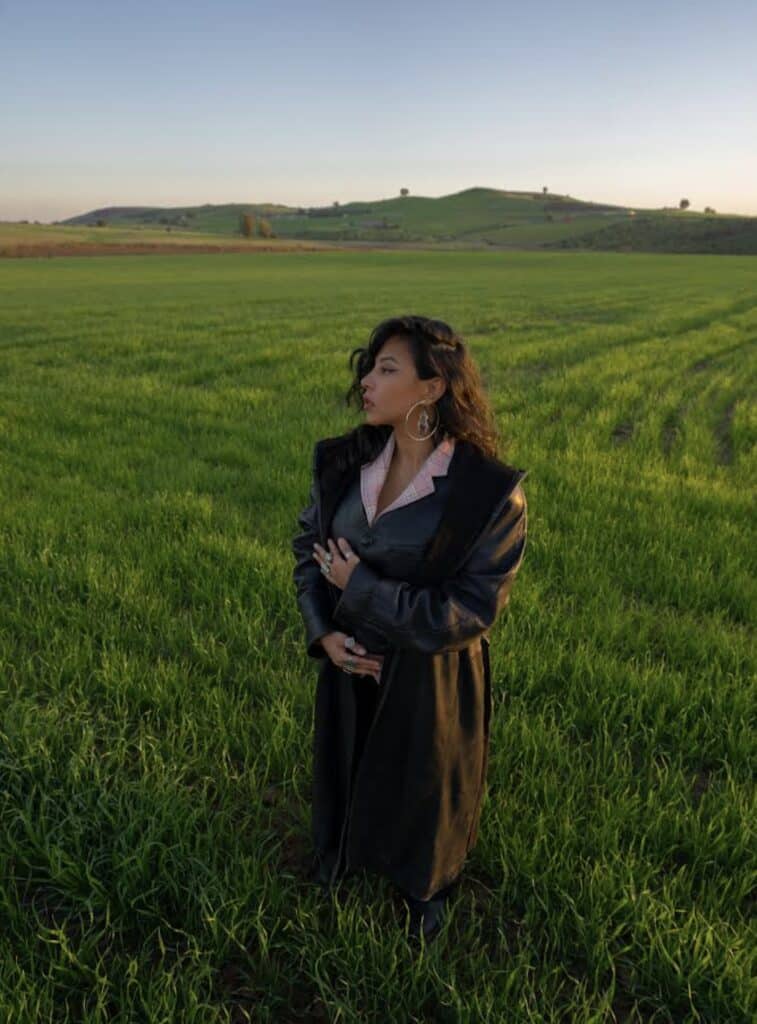
Finally, I absolutely love your style, I’ve seen a couple of pictures on social media, and you look pretty good right now. Do you have a stylist, or do you style yourself?
Rhita Nattah laughs and asks me if I think she works with a stylist with all she has told me.
I don’t think you have a stylist because you work as an independent.
But alas, I was wrong. Apparently, Rhita Nattah was convinced by her friends to do a couple of photo shoots and work on her image. Before that, she was solely focused on the music and the sound. If you’re curious to know what her style looks like, you should check it out here. It’s unique. She gives me a brief history of the bold and fashionable rings that adorn her fingers.
That’s cool. I’ve enjoyed listening to you talk about your art and everything you love to do.
I want my music to feel like home to people; that’s my main goal.
Of course, we look forward to hearing more of your music.
Inshallah.
Okay, I must confess that the conversation lasted over thirty minutes. But I’m sure you can understand why it felt like only thirty minutes because it was certainly interesting. For now, use her latest EP INNER WARRIOR to keep you company.
If you’re just as excited as we are to know when the next Rhita Nattah music drops, stay glued to our social media pages for all your daily music updates!
If you enjoyed this interview, you’ll love the exclusive conversation we had with Ghanaian star, E.L.

